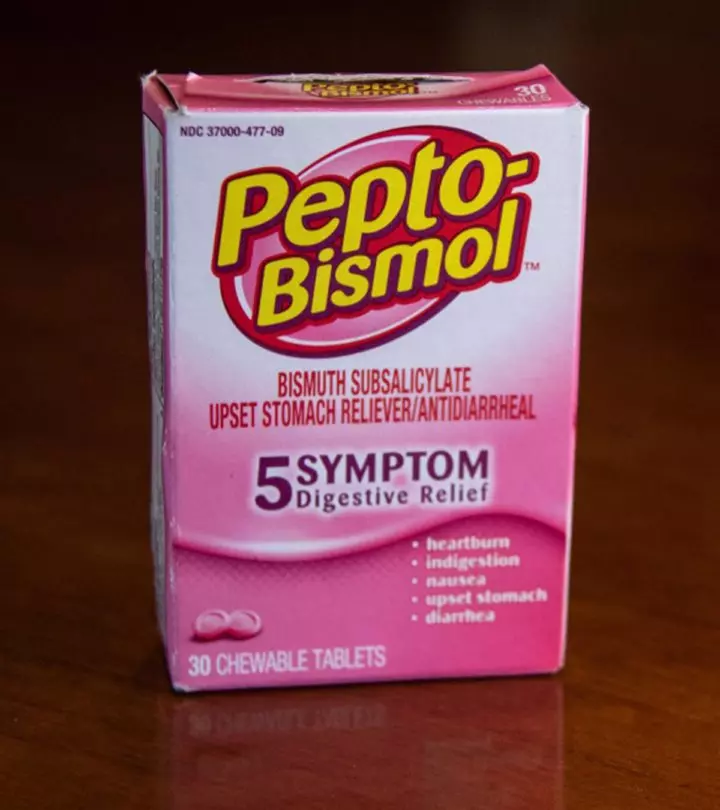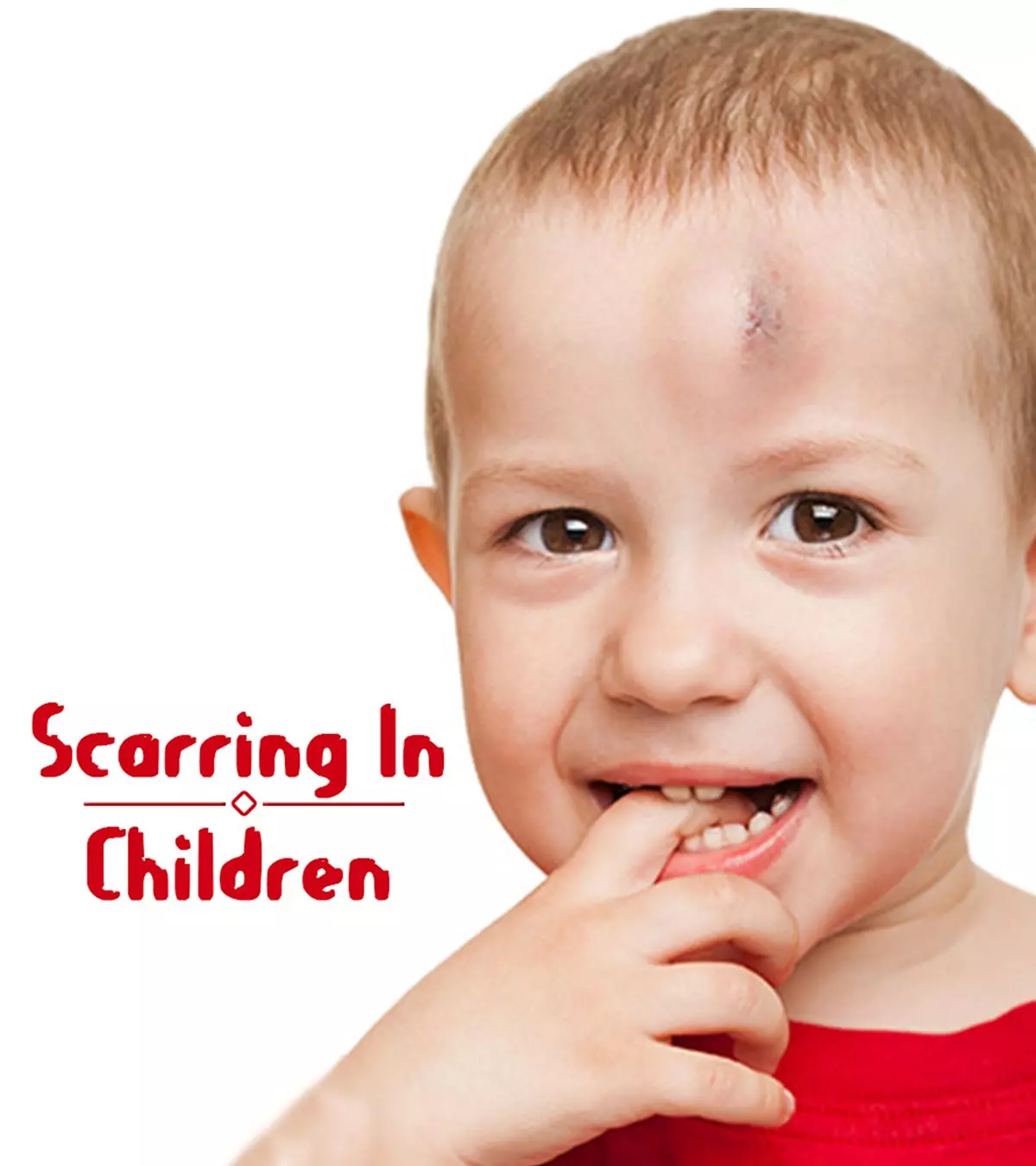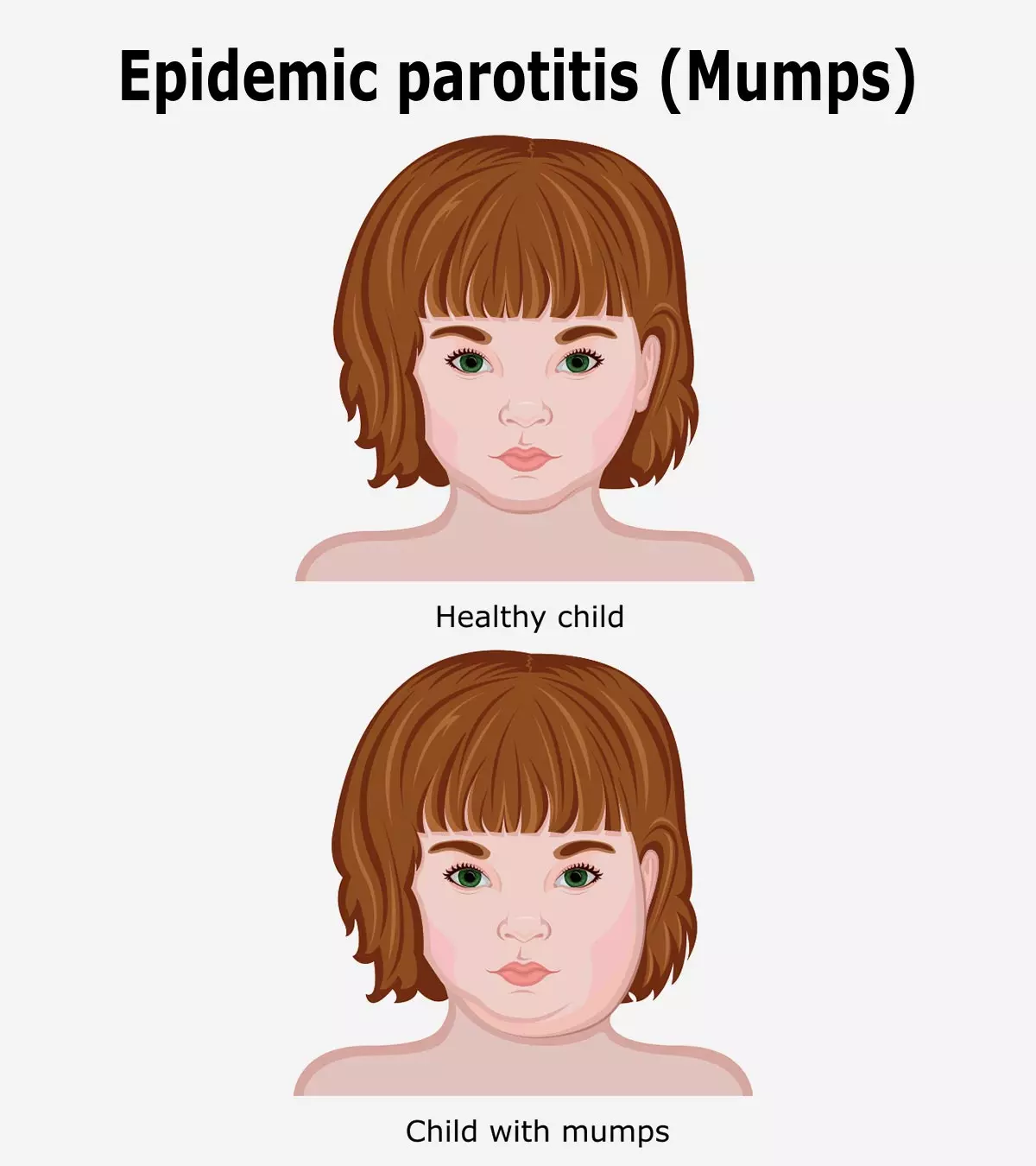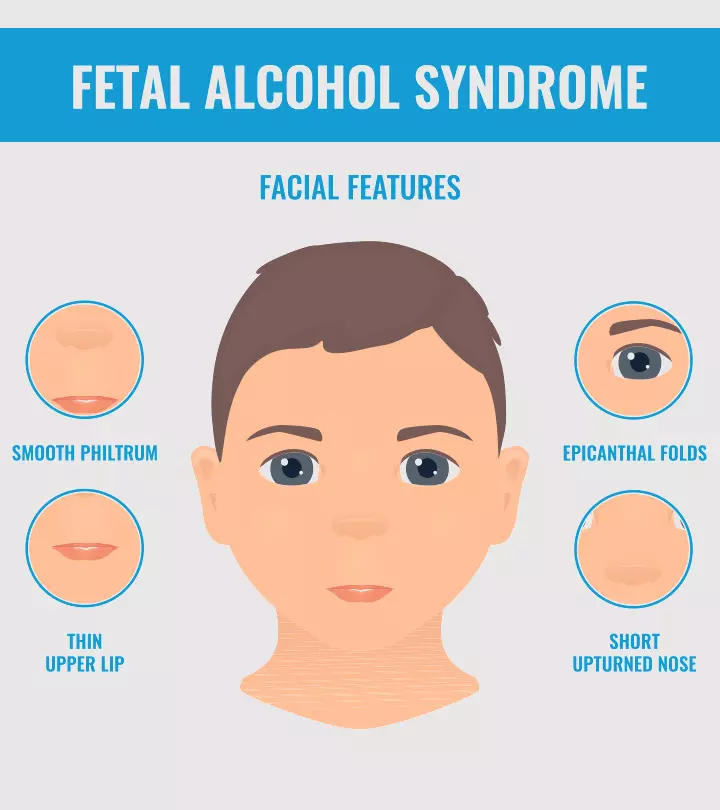
Image: ShutterStock
Children pick up different habits as they grow. Healthy habits for teens can go a long way in helping them lead a healthy and peaceful life in the future whereas poor hygiene or eating habits can be detrimental for them. Adolescence is a key period for personal development, and building healthy habits during this time can provide long-term advantages. These important habits can helps teens enhance their physical health, mental wellness, and overall lifestyle. However, adolescents are often seen to have more affinity towards bad habits such as unhealthy diet, untimely eating, irregular sleep routines, and inappropriate screen time. So, as a parent, how can you help your teenager inculcate good habits? Dive into this post as we take some measures to help you guide your child in picking up healthy habits.
Key Pointers
- Physical activity should be included in a teenager’s routine while sedentary activities such as watching TV and video gaming should be minimized.
- A good sleeping routine and proper oral and food hygiene habits should be encouraged.
- To lower the risk of health problems, teenagers should avoid consuming alcohol and smoking.
- Screen time should be limited and spending long periods online should be avoided to reduce the risk of internet addiction.
- The practice of yoga and meditation can improve the physical and mental wellness of teenagers.
7 Healthy Habits For Teens
Building healthy habits during the teen years sets the foundation for a strong body and mind throughout life. From balanced nutrition to regular exercise, adopting positive routines early helps teens feel their best and stay energized every day.
1. Establish healthy eating routines

Healthy eating isn’t limited to making healthy food choices. It also talks about following a regular and timely eating pattern. Instruct your teens to follow these healthy eating routines:
- Have your breakfast every day.
- Have your meals and snacks on time.
- Eat three balanced meals and healthy snacks in a day (1).
- Have your meals on table along with your family, rather than gulping down food in front of TV.
- Give yourself enough time to have your meals and avoid eating in a hurry.
- Make sure your teen’s meal contains sufficient vegetables since they are rich in numerous nutrients and offer ample health benefits.
- Ensure your teen drinks plenty of water daily. Drinking at least eight glasses of water daily is necessary to good kidney health, good skin, and energized muscles (2).
- Limit sugary drinks. Be mindful with fruit juice, as it can be high in calories — whole fruits are always a healthier and more nutritious option (1).
 Experts say
Experts say2. Incorporate physical activity into your daily life
Encouraging your teen to engage in physical activities regularly is crucial for their overall health and well-being. According to the 2017-2020 National Health and Nutrition Examination Survey (NHANES), the prevalence of obesity among children and adolescents aged 2-19 years was 19.7% (3). There are several benefits of playing sports for teens. So, encourage your teen to walk every morning, take your dog out, play some outdoor games or sports, jump on a trampoline, and stay fresh and active every day. Help them set realistic fitness goals, like aiming for 30 minutes of physical activity on most days. These small goals can help build lasting habits over time. Prevent your teen from sitting in front of the television or playing video games for hours (4). As per data by the CDC, between July 2021 and December 2023, 61.1% of children and teens in the US engaged in at least 60 minutes of physical activity most days or daily. However, activity levels dropped as screen time increased—70.4% stayed active with ≤2 hours of screen time, compared to 54.4% with ≥4 hours (5). Make them a custom timetable that allows them to practice physical activity regularly. Gyming is another physical activity teens can incorporate into their daily routine.
Chris Davidson, a father and fitness instructor, shares how he helped his son start gyming. He says, “After failing my first attempt, where I overwhelmed him with too many ‘knowledge bombs,’ overly keen to make him love working out ASAP, I returned to the drawing board. I sat down and came up with six lessons I wanted to teach him over the course of a few visits to my training studio. I sneaked in these lessons between sets while we worked out together, as I was keen to avoid the whole thing feeling like school to him… I wanted to teach him the basic movements before diving into individual exercises. Setting this groundwork would also help him cope in a busy gym if the equipment he needed was unavailable — he would understand what else he could do to hit the same muscle group (i).”
3. Floss regularly
Another healthy habit for teenagers you should not forget to inculcate. Instruct your teen to brush their teeth every day before going to bed and after they wake up. Show them how to floss for one or two minutes. It will help them develop good oral hygiene. Flossing enhances the positive effects of brushing the teeth and prevents gum infections. Dental floss should be an integral part of self care for teens.
 Quick tip
Quick tip4. Establish a good sleeping routine

Following a good sleeping routine will help your teen stay fresh and fit. Encourage your teen to follow a bedtime routine in their daily schedule that helps them relax due to:
- Experts suggest teens aged 13 to 18 need 8 to 10 hours of sleep each night. Yet, nearly 60% of middle schoolers and 70% of high schoolers in the US lack enough rest on school nights (6)
- Limiting caffeine and energy drinks later in the day can help with sleep (6)
- Eating healthy and light before going to bed
- Having a warm bath
- Reading
- Listening to pleasant, relaxing music
- Going to bed at or nearly the same time every day
- Make sure your teen turns off the computer, television, video games, and movies at least 30 minutes before retiring to bed (7).
5. Practice yoga and meditation
Practicing yoga exercises and meditation techniques daily can help your teen stay active and lead a fit and disciplined lifestyle. Yoga poses and meditation for teens can enhance their physical as well as psychological health and help them handle stress better than usual. It also boosts concentration and memory, as focusing on various movements strengthens skills that can support better academic performance (8).
 Point to consider
Point to consider6. Stay away from alcohol and smoke
Teens often have a tendency to get influenced by peer pressure or have the inclination to try smoking or alcohol. In 2024, e-cigarettes became the most common tobacco product among U.S. middle and high schoolers, with 1.63 million students using them, states the CDC (9). Moreover, based on teh data collected by the National Institute on Alcohol Abuse and Alcoholism, around 12.6 million people aged 12 to 20 (33.1%) reported trying alcohol in 2023 (10). However, smoking and drinking alcohol frequently can affect their health and behavior. Research shows a strong link between teen smoking and mental health issues like depression, disruptive behaviors, and substance use problems (11). Smoking at a young age also leads to serious health concerns, such as frequent respiratory illnesses. Over time, it can reduce physical fitness and harm lung development, cautions the American Lung Association (12). Since the brain continues to develop into the mid-twenties, drinking alcohol as a teen can raise the risk of long-term brain damage (13). So, educate your teens about cigarettes and encourage them to stay away from smoking and alcohol.
7. Avoid spending hours online
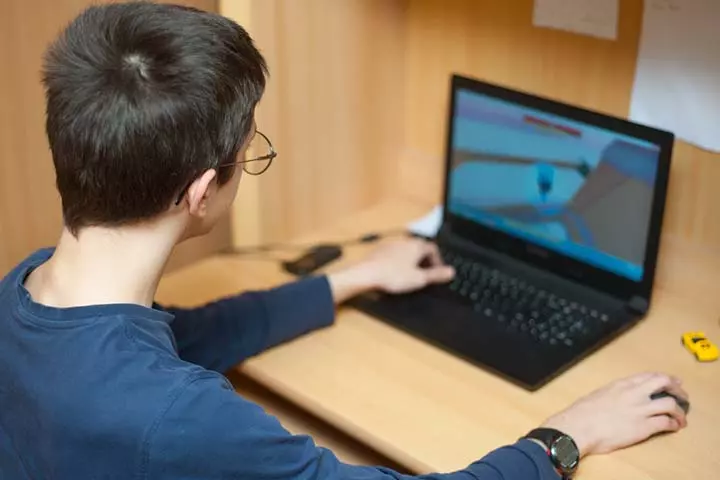
Several studies reveal that teens spending hours online are more vulnerable to internet addiction. Internet addiction may lead to impaired cognitive functions in adolescence and also affect your teen’s eyes adversely (14). By 2022, around 95% of teens aged 13 to 17 were using social media, with one-third using it “almost constantly.” A US study revealed that teens spending over 3 hours daily on social platforms faced nearly double the risk of mental health issues, particularly anxiety and depression (15). So make sure your teen doesn’t spend long hours online.
Tips To Stay Consistent With Good Habits
Building good habits as a teen is important for long-term success, but staying consistent can be a challenge with busy schedules and distractions. With the right strategies, teens can maintain positive routines and make healthy habits a part of everyday life.
- Set realistic goals: Choose smaller changes and aim for manageable goals instead of overwhelming yourself. Focus on habits that fit easily into your daily routine, making it easier to stay consistent and avoid feeling discouraged when life gets busy.
- Create a routine: Try doing your habits at the same time each day. When you attach good habits to existing activities, like brushing your teeth as soon as you wake up or doing your laundry after school, they become second nature and much easier to stick with.
- Track your progress: Use an application, journal, or calendar to track and log your daily habits. Seeing your progress visually can motivate you to keep going and helps identify areas where you might need extra focus.
- Limit distractions: Stay focused by putting away devices and avoiding multitasking during important activities. This helps you concentrate on your habits and prevents small distractions from pulling you off track.
- Reward yourself: Give yourself small rewards when you stay consistent. Whether it’s extra screen time, a favorite snack, or hanging out with friends, positive reinforcement keeps you motivated and makes good habits fun.
Consistency takes time and patience, but by setting realistic goals, creating routines, and rewarding their efforts, teens can successfully stick to good habits and build a healthier, happier lifestyle.
Frequently Asked Questions
1. How can teens manage their time?
Teens may manage their time by determining their goals and allotting specific times to finish each. They should be taught to identify distractions, such as phones and computers, and avoid the propensity towards procrastination. They may take study breaks, use soft music, and create an environment that supports their learning style and include it in their daily discipline. Overscheduling may also be harmful, and teens should stick to a practical work schedule that allows them free time for themselves (16).
2. How can parents encourage teens to develop good habits?
Since children learn from observing, parents need to be role models of good habits. Parents must follow the same habits they expect their children to follow. Setting appropriate and healthy rewards for good work and habits may also encourage teens (17).
3. How can teens improve their focus and concentration?
Completing one task at a time, setting a specific time for homework, screen time, and play, taking planned breaks, and breaking down bigger tasks into smaller chunks may help teens improve their focus and concentration. Additionally, breathing exercises may help reduce anxiety and improve focus and lead them toward a better way of life (18).
Healthy habits go a long way in defining a person’s future. Childhood and teenage years are the best time to develop healthy habits since young people are easier to mold. So, as parents, you should encourage healthy habits in your teenagers. Some habits for teens that you may teach them are developing good eating habits, incorporating physical activity in their daily routine, and getting adequate sleep. However, since teenagers get easily influenced by the outside world and their peers, they may show affinity toward bad habits. Hence, your constant support and encouragement are essential to keep them on track and lead them toward a healthy life.
Infographic: Tips For Teenagers To Eat Healthy
It isn’t difficult to follow a healthy eating lifestyle. Teenagers don’t need any strict food guidelines to eat healthily. Simple dietary changes are good, to begin with. Here are some dietary tips to help teens become their healthiest version. Don’t forget to save and share with your teen!
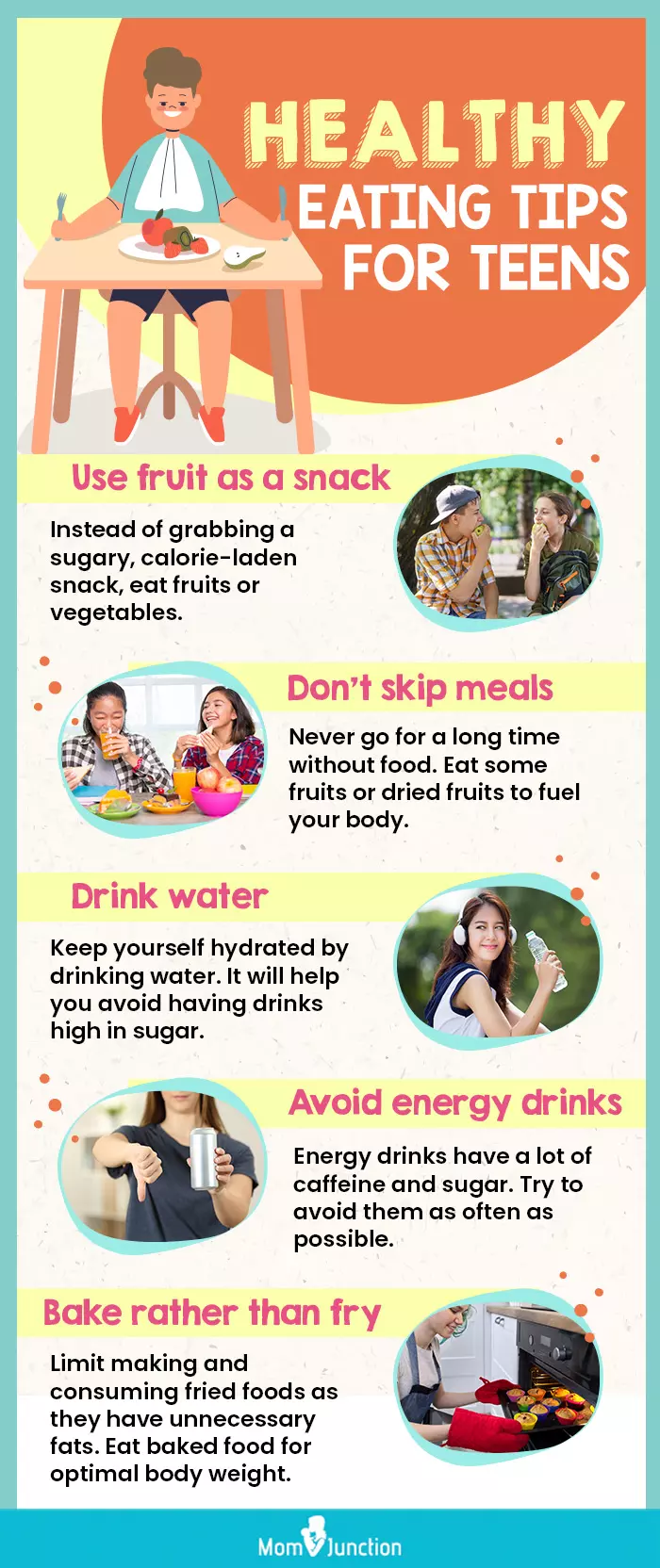
Illustration: Momjunction Design Team
Illustration: Healthy Habits For Teens To Follow
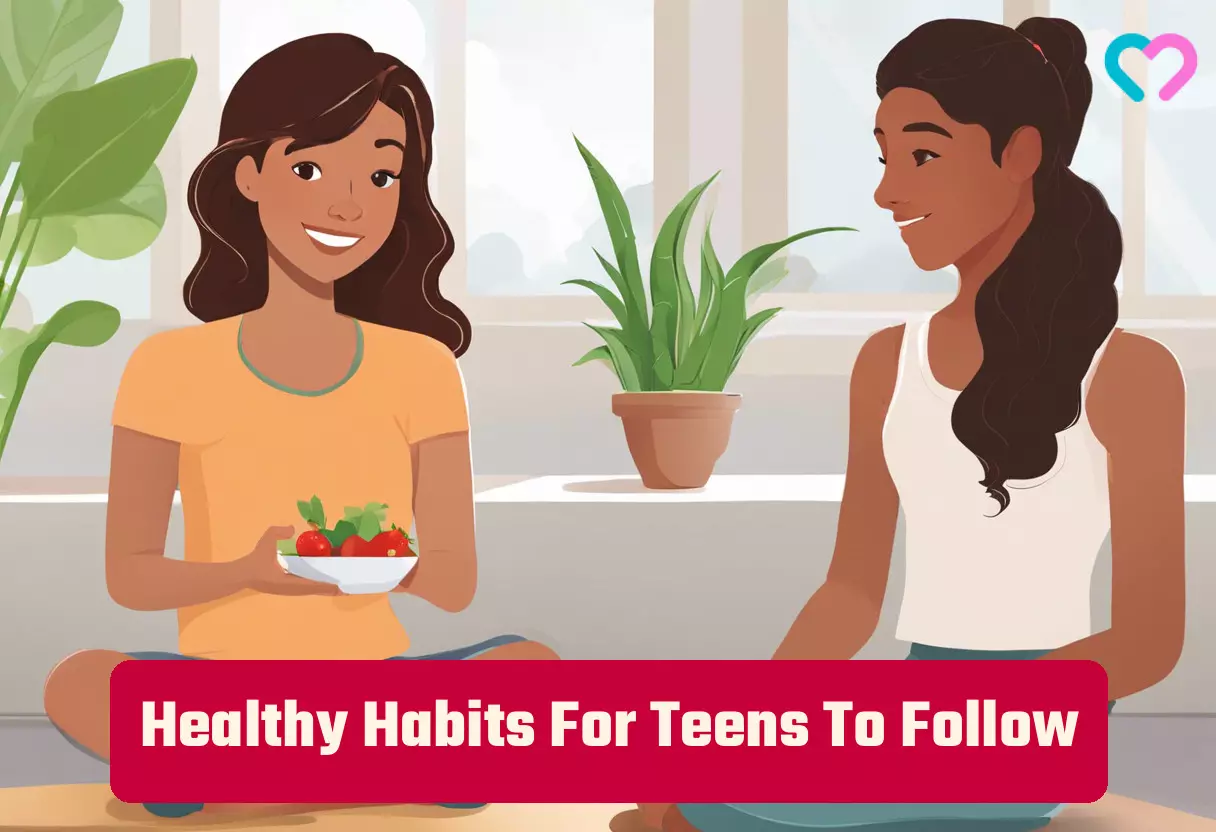
Image: Stable Diffusion/MomJunction Design Team
Learn how to help your children develop healthy behaviors that enhance overall well-being. Discover useful ideas and tactics to ensure their long-term health and happiness.
Personal Experience: Source
MomJunction articles include first-hand experiences to provide you with better insights through real-life narratives. Here are the sources of personal accounts referenced in this article.
i. The 6 lessons i taught my teen about how to love working out.https://medium.com/in-fitness-and-in-health/how-i-taught-my-teenager-to-fall-in-love-with-working-out-90c4874d5d8e
References
- Healthy Eating During Adolescence.
https://www.hopkinsmedicine.org/health/wellness-and-prevention/healthy-eating-during-adolescence - HOW MUCH WATER DOES MY CHILD NEED?
https://riseandshine.childrensnational.org/how-much-water-does-my-child-need/ - National Health and Nutrition Examination Survey 2017–March 2020 Prepandemic Data Files — Development of Files and Prevalence Estimates for Selected Health Outcomes.
https://stacks.cdc.gov/view/cdc/106273 - Children – keeping them active.
https://www.betterhealth.vic.gov.au/health/healthyliving/children-keeping-them-active - Percentage* of Children and Adolescents Aged 12–17 Years Who Participated in 60 Minutes of Physical Activity Most Days or Every Day† by Daily Hours of Screen Time Use§ — United States July 2021–December 2023.
https://www.cdc.gov/mmwr/volumes/73/wr/mm7344a5.htm - Teens and Sleep.
https://www.sleepfoundation.org/teens-and-sleep - Screen Time and Children.
https://www.aacap.org/AACAP/Families_and_Youth/Facts_for_Families/FFF-Guide/Children-And-Watching-TV-054.aspx - 7 Benefits of Yoga for Young Kids.
https://azearlychildhood.org/resources/articles/7-benefits-of-yoga-for-young-kids/ - E-Cigarette Use Among Youth.
https://www.cdc.gov/tobacco/e-cigarettes/youth.html - Alcohol’s Effect on Health.
https://www.google.com/url?q=https://www.niaaa.nih.gov/alcohols-effects-health/alcohol-topics/alcohol-facts-and-statistics/underage-drinking-united-states-ages-12-20&sa=D&source=docs&ust=1741348130039291&usg=AOvVaw1JCIYNBmcFb-9DsaYZQVRw - Cigarette Smoking Among Adolescents With Alcohol and Other Drug Use Problems.
https://pmc.ncbi.nlm.nih.gov/articles/PMC1931414/ - Tobacco Use Among Children and Teens.
https://www.lung.org/quit-smoking/smoking-facts/impact-of-tobacco-use/tobacco-use-among-children - Alcohol and Teenagers.
https://www.betterhealth.vic.gov.au/health/healthyliving/alcohol-teenagers - Hilarie Cash et al;(2012) Internet Addiction: A Brief Summary of Research and Practice.
https://www.ncbi.nlm.nih.gov/pmc/articles/PMC3480687/ - A Tech-Based World: The Risks and Benefits of Social Media and Screentime.
https://www.bakercenter.org/screentime-1 - 3 steps for teens to master time management.
https://www.connecticutchildrens.org/growing-healthy/3-steps-teens-master-time-management - Ways to encourage good habits in children.
https://www.academicheights.in/ways-to-encourage-good-habits-in-children/ - Tips for helping your child focus and concentrate.
https://www.pbs.org/parents/thrive/tips-for-helping-your-child-focus-and-concentrate - Why we overeat while watching TV?
https://health.clevelandclinic.org/put-down-that-remote-heres-why-we-overeat-in-front-of-the-tv-and-how-to-stop - Yoga for children.
https://www.actionforhealthykids.org/activity/yoga-and-mindfulness/
Community Experiences
Join the conversation and become a part of our nurturing community! Share your stories, experiences, and insights to connect with fellow parents.
Read full bio of Shreshtha Dhar
Read full bio of Debolina Raja
Read full bio of Swati Patwal
Read full bio of Kavita Kankani










